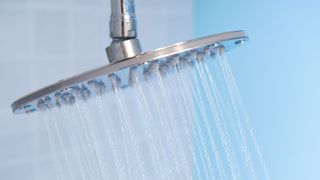To help you discover the best tankless water heater for your home, we’ve evaluated both gas and electric water heaters, all from a number of top-rated manufacturers such as Stiebel, Rinnai and more. Each model in our guide comes with a different level of power, which is all dependent on its flow rate. Flow rate is measured in gallons per minute (GPM). The higher the GPM, the more capable your tankless water heater is for supplying you with hot water for a range of faucets. If you have a large home, the best tankless water heater for you will naturally have a higher GPM. After all, there’s nothing more frustrating than being last in line for the shower, only to find the hot water has run out. Price wise, the electric tankless water heaters are usually more affordable to install than gas models. However it’s worth noting that they are less powerful than the gas-powered tankless water heaters. So if you require hot water for multiple bathrooms, across multiple floors it may be worth investing in a gas model. While if you live in an apartment or flat, an electric tankless water heater should do the job. If you’re looking for other ways to heat your home, we’d also recommend our guides to the best baseboard heaters (opens in new tab) and the best gas furnaces (opens in new tab).
1. Stiebel Eltron Tempra 29 Plus: Best electric tankless water heater
The Stiebel Eltron Tempra 29 Plus is an electric tankless water heater that is suitable for homes that have up to three bathrooms. Depending on the ground water temperature where you live, this electric tankless water heater can provide a flow rate of up to 6 GPM but you will need a 240 volt electric service for this water heater to work. Easy to control, the Stiebel Eltron Tempra 29 Plus tankless water heater has a digital display and also benefits from a sleek and modern design that won’t impose on the space in your home. Another reason why we highly rate the Stiebel Eltron Tempra 29 Plus tankless water heater is its Advanced Flow Control functionality. What this means is that you shouldn’t ever really run out of hot water. When hot water levels are getting low, this tankless water heater automatically adjusts its output so that the water’s temperature is maintained. The Stiebel Eltron Tempra 29 Plus is also energy-efficient and only uses the minimum amount of energy needed to provide you with hot water.
Read our Stiebel Eltron Tempra 29 Plus review (opens in new tab)
2. Rinnai RUC98iN Ultra Series: Best gas tankless water heater
The Rinnai RUC98iN Ultra Series is a gas tankless water heater that is both powerful and energy-efficient. This tankless water heater won’t take up much room, however, it is quite heavy. Featuring a digital display to control your water temperature, the Rinnai RUC98iN Ultra Series also has a temperature lock so that children won’t be able to adjust it. This gas tankless water heater has a wide flow rate range, meaning it can be used for homes with multiple bathrooms. Its flow rate varies from 0.26 right up to 9.8 GPM. What’s more, the Rinnai RUC98iN Ultra Series tankless water heater has an energy factor of 0.95 and can be used with natural gas or propane. It is also Energy Star certified, however, you will pay more for the initial purchase, as this tankless water heater doesn’t come cheap.
Read our Rinnai RUC98iN Ultra Series review (opens in new tab)
3. EcoSmart ECO 27: Best small tankless water heater
The EcoSmart ECO 27 tankless water heater is an electric heater that has been designed for small homes or apartments that have no more than two bathrooms. The EcoSmart ECO 27 provides an output of 27kw and it’s compact. It will need a 240-volt electrical system in order to work but it has a sleek finish and wouldn’t look offensive if you’re unable to hide it away. Providing a maximum flow rate of 6.5 GPM, this tankless water heater isn’t as powerful as some of the others in our round up but it also isn’t designed to be used in a home with multiple bathrooms. What is great about this tankless water heater is that it’s self-modulating. This means it’s energy-efficient and the water heater automatically adjusts the amount of energy it uses depending on how much hot water you’re using and what temperature you need the water to be.
Read our EcoSmart ECO 27 review (opens in new tab)
4. Rheem RTEX-13: Best point-of-use tankless water heater
The Rheem RTEX-13 is an electric tankless water heater that is suitable for small homes or apartments, as well as boats, RVs, or point-of-use water heating. This tankless water heater is small and light, making it ideal for installing in small spaces. You can expect a flow rate of 4.8 GPM from the Rheem RTEX-13 tankless water heater, which is about enough for a shower and two faucets. On the front of the water heater, you’ll find a digital display and nine different temperature settings. This water heater, however, isn’t Energy Star certified and it does require 240 volts and 54 amps of electricity in order to work. Nevertheless, you can expect the same self-modulating features that other tankless water heaters use, and overall the Rheem RTEX-13 scores well for energy efficiency.
Read our Rheem RTEX-13 Tankless Water Heater review (opens in new tab)
What to look for in a tankless water heater
Electric water heater vs gas water heater Tankless water heaters use one of three power sources: electricity, natural gas or propane. In some cases, the type you buy is dictated by the power source available in your home, so you won’t have a say in the matter. Still, it’s good to know what your options are if you have more than one power source. You can expect electric models to have lower operating costs but be more expensive to buy. In contrast, natural gas and propane models cost less to buy and have slightly higher operating costs. Gas models also work when your power goes out. Size and flow rate The tankless water heater’s size generally impacts its hot water delivery rate. For example, if you need hot water for your entire home, you need a larger unit to keep up with the demands of people using multiple faucets. Smaller models, with a flow rate of around 0.5 gallons per minute (GPM), may only work for a single bathroom or faucet, though they can also serve to supplement a traditional water heater or add hot water to a garage sink outside your home. Tankless water heaters can only provide a fixed amount of heating based on the temperature of the water flowing through them. As such, if you live in a colder climate, you need a larger model with a higher flow rate to produce the same amount of hot water a smaller one can in a temperate climate. Energy efficiency On the whole, tankless water heaters use less energy than conventional water heaters, though some models are more efficient than others. To maximize energy efficiency, look for one that is Energy Star qualified. However, keep in mind that the most efficient water heaters usually have the highest prices.
Why you should hire a professional to install your tankless water heater
Although it’s tempting to install your new tankless water heater by yourself, most homeowners simply don’t have the right skills and experience. Professionals can install water heaters correctly and safely while taking less time overall. They also often have water heater suggestions for your home. Furthermore, some brands only sell through installers. To find the best plumber in your area, take some time to look at their online customer reviews on Yelp, HomeAdvisor, Angie’s List and similar websites. If they don’t clearly outline their pricing and estimated completion time and provide a written quote, don’t use them, even if they are the lowest bid.
Tankless water heaters vs tank storage water heaters: What are the key differences?
Size The first major difference with tankless water heaters is that they are super compact. That’s because, just like their name suggests, they don’t store water. Many of the best tankless water heaters measure in at around two feet tall and just over a foot wide. Which makes them perfect for those who are short on space. While tank storage water heaters usually come with a total capacity of 50 gallons. Efficiency Tankless water heaters don’t produce hot water constantly. They only produce hot water when you turn the tap on, run a shower or press a button to start your dishwasher. This means tankless water heaters can save you a fair few dollars a year on your utility bill. While tank storage water heaters warm up water all day round. Price Tank storage water heaters are cheaper to buy than tankless models. However, don’t let the upfront price fool you. In the long run, or over 15-20 years, they will cost you more in the price you will pay for your water bill. That’s because, as we said, they heat water 24/7. While tankless water heaters usually cost more upfront, but should save you money over the years, because they are only heating water when you need it to. Performance Tank storage water heaters are known for delivering a steady supply of water every time. While tankless models, which can be powered by electric or gas.can take longer to heat.


